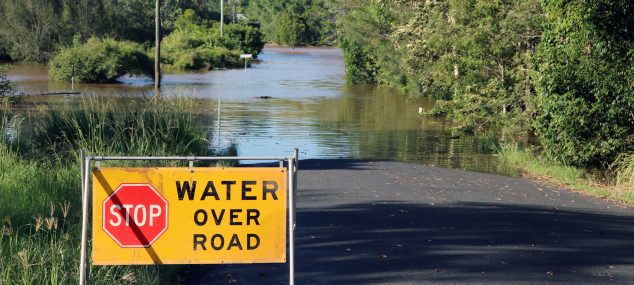
The North Coast Public Health Unit is urging residents and visitors to keep away from floodwater to avoid illness or infection.
Director Public Health Paul Corben said it is important that people treat all floodwater as potentially contaminated.
“People should not swim or play in floodwater because diluted sewage, bacteria, chemicals and physical hazards may be present,” Mr Corben said.
“Swimming in contaminated water may cause illness, including ear infections, eye infections, fever and diarrhoea,” Mr Corben said.
“While the risk of infection is generally low, it’s important to stay away from flood-affected areas and avoid unnecessary contact with mud and floodwaters.”
Residents and visitors are advised to avoid swimming in the ocean, rivers, creeks and lagoons during a flood event, and for at least three days after the rain has stopped. Residents should also avoid swimming if there are signs of pollution such as discoloured water, oil or scum on the water, and litter or other debris floating in the water or on the tide line.
If participating in flood clean-up activities, people should:
- ensure that feet are covered and always wear gloves
- always wash hands thoroughly with soap or alcohol-based hand cleanser.
- cover cuts and abrasions; and
- if you cut yourself on something that has been contaminated with floodwater, check with your GP about your tetanus vaccination.
“To avoid illness, it is important to wash hands with soap and clean water after participating in any flood clean-up activities, and before eating or handling food,” Mr Corben said.
Hints for staying healthy during floods and while cleaning up:
- Wear gloves and suitable footwear when removing mud or debris from homes or yards.
- Yards can be raked to remove debris and if necessary, hosed down.
- Don’t try to check electrical appliances and other equipment yourself, seek professional help.
- Discard any tinned food that has no labels, as well as perishable food that has been out of refrigeration for more than 4hours. If freezer door is kept shut, frozen food will not spoil for at least 24 hours.
- Have septic tanks or pipes professionally inspected or serviced if you suspect damage.
- Avoid being bitten by mosquitoes, cover up with light-coloured clothing, use roll-on insect repellent on exposed skin and apply every few hours.
- To avoid creating mosquito breeding sites in your yard by emptying out pot plant bases and removing all water-holding rubbish.
- When cleaning up, consider your personal health, drink plenty of clear fluids, do not wait until you are thirsty. Take breaks when you can, watch out for heat stress.
For more information on keeping healthy during and after floods or storms, see:
https://www.health.nsw.gov.au/emergency_preparedness/weather/Pages/storms-and-floods.aspx